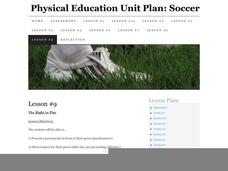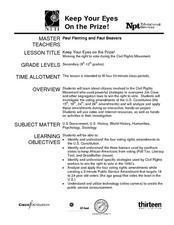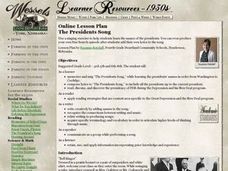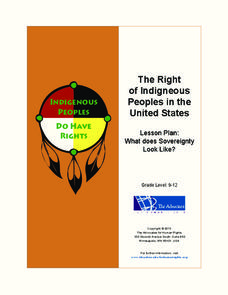Curated OER
Susan B. Anthony Day
The history of women's suffrage and Susan B. Anthony are examined in this social studies instructional activity. Third and fourth graders participate in a simulation of a vote, develop slogans for women's suffrage, complete a KWL chart,...
Curated OER
Physical Education Unit Plan: Soccer - Lesson 9
By the ninth lesson in this soccer unit, learners have studied this sport from many angles. Here they consider the right to play. Take a look at how much money professional athletes earn. Is there a difference between how much men make...
Advocates for Human Rights
Creating a Welcoming School and Community
The final activity in a unit study of immigration and human rights asks class members to design a project for their school that builds support for immigrant classmates. To prepare for this project, individuals use what they have learned...
EngageNY
Grade 9 ELA Module 3, Unit 1, Lesson 5
Ninth graders study the study of animals in an informational text lesson plan that focuses on analyzing text structure. As learners continue reading the first chapter of Temple Grandin's Animals in Translation, they form inquiries and...
Advocates for Human Rights
U.S. Immigration Policy
The United States Immigration Policy is incredibly complex. To gain a deeper understanding of the criteria, quotas, preferences, and categories of immigrants admitted to the US, class members engage in a role playing activity that...
Advocates for Human Rights
Civic Engagement and U.S. Immigration Policy
To conclude their study of immigration and human rights, class members create a civic engagement project centered on an issue of immigration and designed to influence US immigration policy. They examine examples of attempts to influence...
Alabama Department of Archives and History
Alabama's Secession in 1861: Embraced with Joy and Great Confidence. Why?
From December 20, 1860 to June 8, 1861, eleven states seceded from the Union. Alabama seceded on January 11, 1861. Why did so many white Alabamians want to secede? Why did they believe the South could win the war? These are the essential...
Advocates for Human Rights
Refugees and Asylum Seekers
To gain a deeper understanding of the plight of refugees and asylum seekers, class members read stories written from the point of view of an emigrant, map the individual's journey, and note the human rights affected by each stage of the...
Carolina K-12
Citizens United v. Federal Election Commission & the First Amendment
Should Congress limit how much a corporation spends to support a political candidate? Here is a fantastic lesson plan and activities to help young citizens approach this question.
Curated OER
The Colonization of the United States
Bring the Age of Exploration into the 21st century with this ancestry activity! Learners get a chance to explore the complex genealogy of the Spanish settlers through watching two video clips (approximately five minutes each) featuring...
Roy Rosenzweig Center for History and New Media
Immigrant Discrimination
For a class learning about Chinese and Irish immigration in America, here's a great starting lesson plan. It has your critical thinkers examining song lyrics, the Chinese Exclusion Act of 1882, and a political cartoon, and finally...
Curated OER
Keep Your Eye On the Prize
High schoolers learn about citizens who were actively involved in the civil rights movement, and the strategies they used to overcome the Jim Crow laws that were so prevalent in the 1960s. They investigate the voting amendments of the US...
Curated OER
The Presidents Song
Remember learning to spell “encyclopedia” by singing along with Jiminy Cricket? How about using a singing exercise to learn the names of the presidents? “The Presidents Song,” includes the names, in order, from Washington to Coolidge....
Curated OER
Safe In the City
Students read a news article about the most dangerous cities in the United States. In groups, they develop a plan to present to the city council to improve the situation in their own community. They examine how the media presents the...
National Endowment for the Humanities
The President Under the Articles of Confederation
The Articles of Confederation sounds like one big, fancy title to middle schoolers. Here, scaffolded steps help to ease novices into understanding this all-important American document. Discussion questions, lesson activities, and ideas...
Advocates for Human Rights
The Right of Indigneous Peoples in the United States
The sovereignty of U.S. Native American nations is the focus of a resource that asks class members to compare the Right to Self-Determination in the UN Declaration on the Rights of Indigenous Peoples with a fact sheet that details the...
National Endowment for the Humanities
Lesson 4 James Madison: Internal Improvements Balancing Act—Federal/State and Executive/Legislative
Who has the power? The founding fathers asked the same question when the United States was formed. Learners explore issues that arose during Madison’s presidency that raised constitutional questions. Through discovery, discussion, and...
Curated OER
Immigration
This 3-day immigration study draws on historical trends and current events. A worksheet accompanies initial research on one group's U.S. immigration history, giving opportunity for collaborative learning through sharing findings. Groups...
Civil War Trust
Transcribing Civil War History
Primary sources are valuable for understanding the context of historical events, but the diction and dialect in these documents can be difficult to understand. Middle and high schoolers participation in a transcription process in which...
Canadian Civil Liberties Education Trust
That’s Not Fair!
As part of a series of critical thinking exercises, kids consider issues of social justice, especially the factors that must be considered when trying to balance conflicting rights and freedoms.
Civil War Trust
Civil War Newspaper
One photograph can represent so much more than the images on the film. Eighth graders select a photograph from the Civil War era and conduct additional research based on the subject matter from the picture. Once they complete the...
Curated OER
Lesson: Looking Closer: The Artwork of Shinique Smith
A critical discussion regarding the nature of Shinique Smith's second-hand clothing art is the foundation for the lesson. Critical thinkers fully analyze the meaning behind her work, taking close consideration of where the clothing came...
What So Proudly We Hail
Life, Liberty, and the Pursuit of Happiness: A Lesson on the Declaration of Independence
What does it mean to say that a right is unalienable? How did the founding fathers convey this revolutionary concept in the Declaration of Independence? Engage in a close reading and analysis of the Declaration of Independence, and...
Civil War Trust
Gettysburg Address
The Gettysburg Address may have been four score and seven years ago, but its message is still as relevant today. Young historians explore the context of the famous speech, as well as its central theme and argument, before discussing the...

























